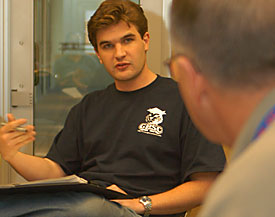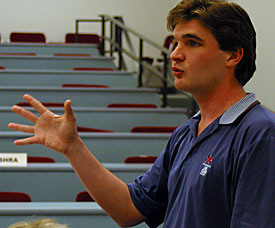 |
|
DAVID HARDEN/Arizona Daily Wildcat
|
Pete Morris, president of the Graduate and Professional Student Council, has worked closely with administration this year to guarantee financial aid for needy graduate students.
|
|
By Tacie Holyoak
Arizona Daily Wildcat
Friday March 28, 2003
University offers financial aid, healthcare benefits
Graduate students over the years have feared that graduate education had lost value in the eyes of the UA administration.
That fear climaxed this year when, in January, administrators proposed the elimination of the dean of the graduate college, and then, one month later, asked regents for the largest tuition increase in UA history, a $1,250 hike for resident graduate students.
Concerned about their future at UA, graduate students got involved, writing letters and filling up town halls to voice their concerns.
"I've listened to the administration's arguments and they have heard our opposition," said Matt Chidley, a second year optical sciences graduate student.
The issues brought up this semester have created an "atmosphere of apprehension" about the future of graduate education, said Pete Morris, American Indian studies graduate student and president of the Graduate and Professional Student Council.
Though this year has been one trial after another for graduate students, they no longer question whether administration supports them.
The high level of graduate student involvement, and the GPSC's efforts to work with administrators to protect graduate students, has made for an exceptional year, Morris said.
 |
|
EMILY REID/Arizona Daily Wildcat
|
Graduate and Professional Student Council President Pete Morris urges the faculty senate to continue to support graduate education even during budget crises.
|
|
Loss of a leader
When the plan to eliminate the position of dean of the graduate college was announced in January, the question of administrative support for graduate
education was a constant one on many graduate students' minds.
In a letter sent to President Pete Likins in February, the GPSC said graduate students saw the elimination of the position of the dean of the graduate college, held by Gary Pivo, as "devaluation" of graduate education.
Although administration has committed to focusing on graduate education, the plan to eliminate such an advocate for graduate students sent a conflicting message, Morris said.
The decision, announced in President Pete Likins and Provost George Davis' Focused Excellence plan, would assign the dean of the graduate college's responsibilities to the associate vice president for research.
Administrators have assured graduate students that this decision will not diminish support for them.
Dick Powell, vice president for research and graduate studies, said the person who takes on the responsibilities of the dean will be as strong an advocate as Pivo was.
Morris said he hates to see Pivo leave, but he does not believe graduate education is vulnerable without him.
Under Pivo's leadership, graduate education has gained strength and momentum that will allow the GPSC to work on improving the quality of student life for graduate students, Morris said.
Pain and gain
Sourav Banerjee, a civil engineering research assistant, needs more financial support to continue his education at the UA. He hopes he will not have to return to India, and he said he understands that the administration is doing all they can to help him stay.
 |
|
It is very bad for me, but they are not against us
-Sourav Banerjee, civil engineering research assistant
|
 |
"It is very bad for me," he said, "but they are not against us."
All semester, graduate students have fought to protect themselves from tuition hits by working to secure need-based financial aid and an administrative guarantee to offer tuition remission and tuition refunds to all graduate teaching assistants, Morris said.
Twenty-four hours before the Arizona Board of Regents' meeting earlier this month, they sent a plethora of letters to the board, asking the regents to ensure administrators' pledge to support graduate students.
They were heard.
Regent Fred Boice said he wanted assurances from Likins that he would protect graduate students.
This support, and the efforts of graduate students and their supporting organizations, paid off, Morris said.
Earlier this month administrators agreed to provide at least $700,000, and as much as $1.1 million, to protect needy graduate students, Morris said.
In addition, a $600,000 tuition waiver commitment was made to provide all GTAs with 50 percent tuition remission.
These victories were not only a result of a high level of involvement on the part of graduate students, but also a result of GPSC working closely to secure financial aid for graduate students, Morris said.
The role of the GPSC
Graduate students did not always have the GPSC to back them as a strong advocate to work with administration.
Prior to 1996 the GPSC did not officially exist with a constitution and its own budget. Instead, the Associated Students of the University of Arizona was the only student government on campus and only allowed the graduate council one vote.
During the 1996-1997 school year, GPSC became an independent organization, giving a stronger voice to graduate students, Powell said.
One of the first issues GPSC dealt with was giving health care to graduate students, said Jonathan Hartman, former GPSC executive vice president and chair of the health insurance committee.
For nearly four years, graduate organizations such as the GPSC and the English Graduate Union lobbied for health insurance, an amenity never before provided in any form.
It took a lot to convince the administration, Hartman said, but by December 1998, health care was introduced at UA.
With one small victory under its belt, GPSC began to address other crucial graduate student issues.
In 1999, graduate students advocated to decrease GTAs' heavy workloads.
Students gathered petitions asking for the help of administrators. The administration, in turn, received a $1.5 million budget from the legislature dedicated to hiring new TAs and decreasing class sizes.
Gaining momentum, the GPSC tackled more issues and solidified the university's financial support for graduate education.
In 2000, graduate students focused on allocating tuition remission for GTAs, said Jason Auxier, 2000-2001 GPSC president.
"We pushed very hard for the administration to make this a priority," he said.
For many graduate students, improved tuition remission was a crucial issue that had to be solved to help graduate teaching assistants.
"You get paid, and you take your earnings and give them back," he said. "It's counterproductive," said Brian Nelson, a 2002 graduate with a master's degree in creative writing.
In the spring of 2002 Likins gave GTAs a 25 percent tuition waiver.
And now administrators have not only committed to improving that to 50 percent, but they have also said they want to increase tuition remission even more in the future.
Although the efforts of graduate students have made significant impacts in the past, and continue to do so, many issues are not absolutely solved, Powell said.
"We can't just wave our hands and solve them," he said, but the administrators and other graduate supporters will continue to work toward improvements.
Specifically, graduate students want to see more improvements at UA, including a higher tuition remission for graduate teaching assistants and better childcare.
Although the benefits were a welcomed addition, the GPSC is still working to improve the healthcare package, Morris said.
UA's healthcare package doesn't cover families, leaving students to pay out of their own pockets for coverage, or fall back on Arizona's KidsCare program, which provides services to very low income families.
Regardless of all the work left to do, administrators and graduate students admire the achievements that have already been realized.
"We've been successful," Pivo said. "We've made remarkable progress, even in tough times."

